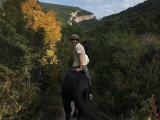To save you time brainstorming alternatives, check out this section for options that might be perfect for you. While your Easter or summer break might be limited to bank holidays or allotted leave days, your children’s holidays last much longer.

This often becomes a headache, especially for parents of older children.
For very young children, playgrounds are ideal—they play, learn, and have fun while being supervised. But there are other options for kids gaining independence: camps. This article expands on them, but if you’d like to explore alternatives, check prices and availability here.
Camps come in many forms, varying by duration, location, or theme. Though it may seem simple, this diversity demands careful consideration to choose the best fit for your child.
Urban camps, mountain hostel stays, day camps, residential camps, English-language camps, music camps, football academies, equestrian camps...

1.- First and foremost: a camp isn’t just about keeping your child them while you work.
3.- Create a time plan and decide on the stay type. Urban/day camps typically run at schools or sports centres—children are dropped off mornings and collected afternoons. Some offer flexible hours, like optional lunches. These suit younger kids easing into group dynamics.

Residential camps, however, involve longer stays (usually 1–2 weeks) with full-board lodging. These cater to children aged 8–9 and up.
4.- Once the duration’s settled, pick a theme. You know your child’s passions and talents best. Listen to them, and decide together.
- For music lovers, music camps teach basics like instrument skills.
- For horse enthusiasts, equestrian camps often require no prior experience—great for sparking interest in the sport.

- For adventurers, multi-activity camps blend kayaking, archery, orienteering, hiking, climbing walls, zip lines, and more in nature.
- For budding athletes, football academies, many backed by top clubs.
- English-language camps to practise this essential skill without leaving Spain.

5.- There’s a camp for everyone. Dietary needs, allergies, or health conditions shouldn’t stop your child from enjoying camp. Many cater specifically to these requirements.
6.- Budget. Factor this in, but don’t cut corners—weigh options carefully for your child’s sake.
Check what’s included: equipment, facilities, insurance, lodging, and meals all affect pricing.
7.- To gauge quality, visit the facilities and meet staff who’ll supervise and teach your child.

Staff should be education specialists, with topic-specific expertise (e.g., equestrian pros for horse camps, native/bilingual instructors for English camps).
8.- Where to apply these tips? Online is a great resource. Yumping.com’s new Camps category makes it easy to find options by sub-category and region.

Now you’re equipped to choose—and though it may seem early, many Easter/Summer camps are already open for bookings. A unique, fun, and enriching experience awaits.












